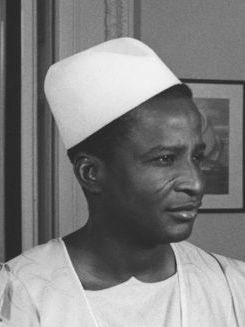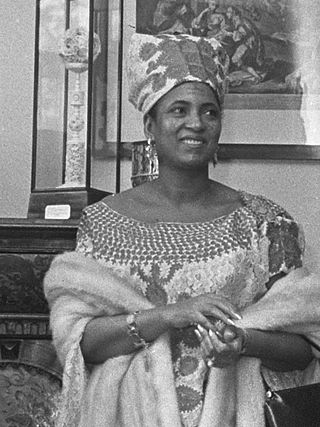
Hama Amadou is a Nigerien politician who was Prime Minister of Niger from 1995 to 1996 and again from 2000 to 2007. He was also Secretary-General of the National Movement for the Development of Society (MNSD-Nassara) from 1991 to 2001 and President of the MNSD-Nassara from 2001 to 2009. Amadou is from the Kurtey, a Fula sub-group, and was raised in the Tillaberi Region, in the Niger River valley, north of Niamey.

The unicameral National Assembly is Niger's legislative body. The National Assembly proposed laws and was required to approve all legislation. It was suspended following the 2023 Nigerien coup d'état by the military junta.
Souley Abdoulaye was a Nigerien politician. He served as the Prime Minister of Niger from 28 September 1994 to 8 February 1995. He later served in the government under President Ibrahim Baré Maïnassara as Minister of Transport from 1996 to 1997 and then as Minister of the Interior, in charge of police and internal security, from 1997 to 1999.

Abdou Sidikou was a Nigerien politician and diplomat. Sidikou was the Foreign Minister of Niger from 1967–1970 under Hamani Diori.

Abdou Moumouni University, formerly the University of Niamey from 1974 to 1994, is a public university based in Niamey, the capital of Niger. The main campus is situated on the right bank of the Niger River. Historically, its students and faculty have been involved in protest movements in the capital.
The 1974 Nigerien coup d'état was a largely bloodless military insurrection which overthrew the first postcolonial government of Niger. The government that followed, while plagued by coup attempts of its own, survived until 1991.

Songhoyboro Ciine or Songhay Ciiné is an upriver dialect of the southern Songhay dialect of Niger. It is spoken mostly in the northwestern corner of Niger's Tillaberi region, an area known as Songhay: from Gorouol, a border town with Mali, down to the towns of Tera, Anzourou, Namari Goungou and Say.
Mariama Hima Yankori is a Nigerien film director, ethnologist and politician. She became the first female Nigerien film director in the 1980s, was State Secretary of Promotion of Women and Protection of Children, and later the first female Nigerien ambassador to France.

Aissa Diori also known as Aïchatou Diori was the wife of Hamani Diori and the First Lady of Niger. She amassed a large wealth through corruption, including high-priced real estate. She was killed in the 1974 Nigerien coup d'état.
Mariama Gamatié Bayard is a Nigerian politician and women's rights activist.
Fatimata Gandigui Mariko, better known as Fati Mariko, is a Nigerien singer.
Bouli Ali Diallo is a Nigerien academic and activist.
Alidou Barkire is a Nigerien politician and former Minister of Justice.
Haoua Issa was a Nigerien singer.
Bouli Kakasi is a Nigerien singer.
Zaley is a musical genre of the Zarma and Songhay people of Niger. Most famous during the 1940s and 1950s, it is a genre dominated by female performers, who take as the subject of their songs the virtues of men whose qualities they appreciated. The word itself comes from the Zarma language, and denotes a blend of musical instruments with female voices; it has also come to mean "amorous seeking". Some writers have described the genre's significance as being similar to that of romanticism in nineteenth-century European culture.
Zalika Souley was a Nigerien actress, the first sub-Saharan movie actress, and one of the pioneering actresses of African cinema.

The Songhai, ) is an area in the northwestern corner of Niger's Tillabéri Region populated mainly by the Songhai proper. It is considered the heartland of the Songhai people and the sanctuary of their ancient pantheon and priestly class and the place in which the original lineage of the Sonni dynasty retreated after the coup d'etat of 1493 creating a secret society of magicians, the Sohance.
The Emirate of Say was an Islamic state founded in 1825 by Alfa Mohamed Diobo, a Qadiriyya Sufi leader who came to Say from Djenné (Mali) in 1810. Though Diobo was no conqueror, his control over Say was ensured by both his clerical renown and the diplomatic protection of the Sokoto Empire, also founded by a Fulani Qadiriyya Sufi cleric, Usman Dan Fodio.






